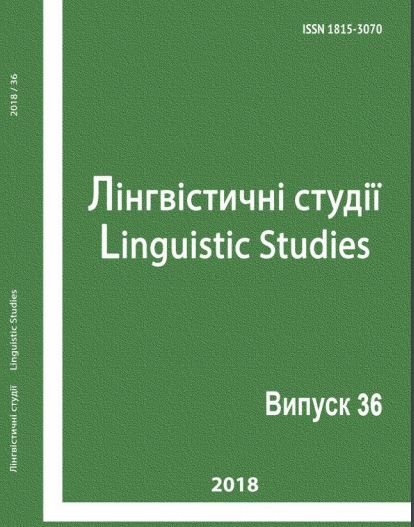До питання про створення автоматичного словника словосполучень української мови.
DOI:
https://doi.org/10.31558/1815-3070.2018.36.23Ключові слова:
автоматичний семантичний аналіз, автоматичний синтаксичний аналіз, автоматичний словник словосполучень, комп’ютерна граматика, орудний відмінок, семантичне відношення, синтаксичний зв’язокАнотація
У статті розглянуто засади створення автоматичного словника словосполучень української мови, створюваного на кафедрі української мови та в лабораторії комп’ютерної лінгвістики Інституту філології Київського національного університету імені Тараса Шевченка. Подано типологію синтаксичних зв’язків та семантичних відношень, на яких ґрунтовано створювану систему автоматичного виокремлення словосполучень, принципи семантичного розмічення словника. Описано експеримент з вилучення з корпусу публіцистичних текстів словосполучень з орудним відмінком, прокоментовано його результати.Посилання
Bolshakov I. A., Gelbukh A. F., and Galicia-Haro S. N. Electronic dictionaries: for both humans and computers. Text, speech, and dialog : second International workshop TSD’99, Plzen, Czech Republic, Sept. 13–17, 1999. Eds.: V. Matousek [et al.]. Berlin: Heidelberg Springer, 1999. 365–368. Print.
Darchuk, Nataliya. Komp`yuterne anotuvannya ukrayins'koho tekstu: rezul'taty i perspektyvy (Computer Annotation of Ukrainian Text: Results and Prospects). Kyyiv: Osvita Ukrayiny, 2013. Print.
Golovin, Boris. Vvedenye v yazykoznanye (Introduction to linguistics). Moskva: Vyssh. shk., 1966. Print.
Karaulov, Jurij. Lingvisticheskoe konstruirovanie i tezaurus literaturnogo jazyka (Linguistic Design and Literary Language Thesaurus). Moskva: Nauka, 1981. Print.
Krasil'shhik I.S., and Rahilina E.V. Predmetnye imena v sisteme «Leksikograf» (Subject names in the system "Lexicographer"). Nauchno-tehnicheskaja informacija (Scientific and technical information). Serija 2. 9 (1992): 24–31. Print.
Kustova, G.I., Ljashevskaja, O.N., Paducheva, E.V., and Rahilina, E.V. Semanticheskaja razmetka leksiki v nacional'nom korpuse russkogo jazyka: princhipy, problemy, perspektivy (Semantic markup of vocabulary in the national corpus of the Russian language: principles, problems, prospects). Nacional'nyj korpus russkogo jazyka: 2003- 2005 (National Corpus of the Russian language). Moskva: Izd-vo «Indrik». 2005. 155-174. Print.
Marchuk, Jurij. Komp'juternaja lingvistika (Computational Linguistics). Moskva: ACT: Vostok-Zapad, 2007. Print.
Rogozhnikova, Roza. Tolkovyj slovar' sochetanij, jekvivalentnyh slovu (Dictionary of combinations equivalent to the word). Moskva: AST: Astrel', 2003. Print.
Vykhovanets', Ivan. Hramatyka ukrayins'koyi movy. Syntaksys (Grammar of the Ukrainian language. Syntax). Kyyiv: Lybid', 1993. Print.
Zahnitko, Anatoliy. Osnovy ukrayins'koho teoretychnoho syntaksys (Fundamentals of Ukrainian Theoretical Syntax). Horlivka: HDPIIM. 2004. Ch. 1. Print.


